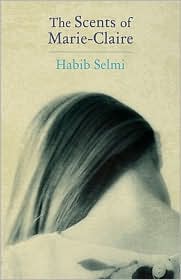Note: This novel was SHORTLISTED for the International Prize for Arabic Fiction, the Arab “Booker Prize,” in 2009.
“Marie-Claire’s constant presence in my home during the first few months made me so happy that I was afraid the happiness might change into its complete opposite. Never in my whole life had a woman loved me as much as Marie-Claire did. It was the first time in my life that I had lived with a woman in this way….And I could not believe that this exceptional, beautiful creature was mine….Mine and mine alone.”
 Tunisian author Habib Selmi, who has criticized the Arab novel in general because it “overwhelmingly emphasizes the social aspect,”* takes the opposite tack in his own novel, creating an intimate portrait of a years-long relationship between a French woman and a Tunisian man, seven years her senior. Selmi believes that “the novel should be a novel of the self as it intersects with its surroundings….[It] is not a sack full of occurrences and changes.”* Not surprisingly, then, his own novel deals almost exclusively with the thoughts of one of the partners in the relationship–Mahfouth, who has a doctorate in Arabic literature and who is currently working in a Parisian hotel and working part-time as a university lecturer. His lover, Marie-Claire, is a devoted but somewhat more free-wheeling partner who loved college but now works at the post office. Everything we learn of Marie-Claire, we discover through Mahfouth’s point of view, and when, after the initial bloom of love wears off, he becomes annoyed with her for doing or saying something he does not like, readers will have no problem understanding why she becomes annoyed with him in turn.
Tunisian author Habib Selmi, who has criticized the Arab novel in general because it “overwhelmingly emphasizes the social aspect,”* takes the opposite tack in his own novel, creating an intimate portrait of a years-long relationship between a French woman and a Tunisian man, seven years her senior. Selmi believes that “the novel should be a novel of the self as it intersects with its surroundings….[It] is not a sack full of occurrences and changes.”* Not surprisingly, then, his own novel deals almost exclusively with the thoughts of one of the partners in the relationship–Mahfouth, who has a doctorate in Arabic literature and who is currently working in a Parisian hotel and working part-time as a university lecturer. His lover, Marie-Claire, is a devoted but somewhat more free-wheeling partner who loved college but now works at the post office. Everything we learn of Marie-Claire, we discover through Mahfouth’s point of view, and when, after the initial bloom of love wears off, he becomes annoyed with her for doing or saying something he does not like, readers will have no problem understanding why she becomes annoyed with him in turn.

Though the book blurb stresses that this is a “collision of cultures,” it seems far less a collision of cultures than a collision of two individual lovers, one of whom is arrogant, selfish, jealous, unable to apologize, and always seeking to blame his partner. Mahfouth is immature and unwilling to bend, and he behaves far more like a spoiled child than a thinking and feeling adult of any particular culture.
Gradually, their childhoods unfold–he, the son of a peasant from a small Tunisian village, and she, a French woman born in Minelle Menton, the daughter of a waiter whom she adored. Always embarrassed by her freckles, she is unusually sensitive to the feelings of the people around her. Mahfouth has grown up exercising power over animals–tormenting scorpions, roasting small birds, burning ants, and abusing donkeys–and this is the first time he has ever been in love. So jealous that he even resents Ladislaus, a boy Marie-Claire once kissed when she was a teenager, Mahfouth tries to provoke her when she ignores him. If she responds in anger, then he feels he does not need to apologize for his own previous behavior. Marie-Claire’s real weapon, however, is her silence. Though she has released his sexual inhibitions, his understanding of love is limited by his lack of experience of love on the emotional level, and he responds with even greater jealousy and a greater need to control.
 Readers know from the outset that the relationship lasts for several years before Marie-Claire finally leaves, but it is the slow deterioration of that relationship from Mahfouth’s point of view that becomes the fascination here. Chronically unable to bear any responsibility for the failure of any aspect of the relationship, Mahfouth has learned little from the years during which Marie-Claire has tried to show him the meaning of love. The essence of the relationship becomes clearer if one re-reads the opening quotation: After emphasizing how ecstatic he was when Marie-Claire moved in with him, Mahfouth’s next sentence reads: “Never in my whole life had a woman loved me as much as Marie-Claire did.” He could never believe that this beautiful woman was “Mine. And mine alone.” And that was the problem. It was always all about him.
Readers know from the outset that the relationship lasts for several years before Marie-Claire finally leaves, but it is the slow deterioration of that relationship from Mahfouth’s point of view that becomes the fascination here. Chronically unable to bear any responsibility for the failure of any aspect of the relationship, Mahfouth has learned little from the years during which Marie-Claire has tried to show him the meaning of love. The essence of the relationship becomes clearer if one re-reads the opening quotation: After emphasizing how ecstatic he was when Marie-Claire moved in with him, Mahfouth’s next sentence reads: “Never in my whole life had a woman loved me as much as Marie-Claire did.” He could never believe that this beautiful woman was “Mine. And mine alone.” And that was the problem. It was always all about him.
Those interested in a love story which reveals every nuance of a complex relationship will find this a fascinating novel. The fact that the reader knows from the early pages of the book that this long-time love will end makes its slow deterioration hypnotically suspenseful in its own right. Selmi’s very intimate novel reveals everything Mahfouth thinks and feels and, through his point of view, everything that Marie-Claire is thinking and feeling. The birthday party she gives for him, the vacations she persuades him to take, and eventually the wild ride she provides one evening show her willingness to help him broaden his horizons and learn t o feel. How and why he is unable to trust and share is a question for the reader to decide. Despite the fact that the main character is unlikable and the ending of the relationship is announced early, Selmi manages to keep the reader involved in his detailed story of a relationship gone bad.
o feel. How and why he is unable to trust and share is a question for the reader to decide. Despite the fact that the main character is unlikable and the ending of the relationship is announced early, Selmi manages to keep the reader involved in his detailed story of a relationship gone bad.
Notes: *The quotations from the author appear on this site: http://en.qantara.de, a German-based magazine in German, English, and Arabic which focuses on “the interface between the Islamic and Western world.” The full interview is enlightening. The author’s photo also comes from this site.
When Marie-Claire and Mahfouth take a trip to Crete, they hike through a gorge, which may have been the Samaria Gorge, pictured here, above: www.west-crete.com Mahfouth also comments that he has walked through the (much smaller) gorges near his home in Tunisia, probably similar to the Selja Gorge, in the final photo by Paco Lozano: www.worldpicturesblog.com
To take a train ride on Le Lezard Rouge through Tunisia and the Selja Gorge, just click on this video link: www.youtube.com The film is by Yves Bertrand.
